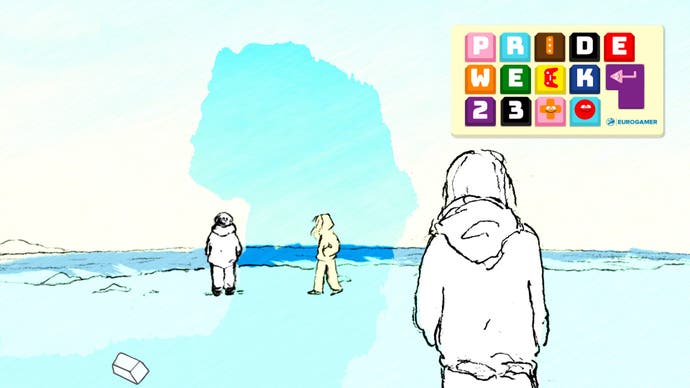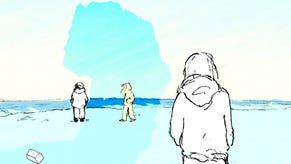If Found… and pushing back on shame
Little big stories.
"Have you ever been on a crowded train with one of your best gay friends and, inside, a tiny part of you is cringing because he is being so gay?"
That's a question posed by my favourite drag queen and Ireland's self-proclaimed gender discombobulator, Panti Bliss, in a biting speech about "checking" herself. What she's "checking" is something most queer people "check" for in public, whether they realise it or not: their own queerness. Am I standing too gay? What about these colourful socks? Are they too much? Will holding a partner's arm in public turn into a problem? Something private and intimate altered into something shameful or political, all through other people's reactions.
That feeling's best thought of as the tension between who people expect us to be and who we really are... or who we're trying to become. Imagined futures are projected onto our bodies like film reels, blurring the skin that lies beneath. That tension feels a lot like shame. But, while video games usually have all the subtlety of a sledgehammer busting through a wall, they're occasionally a great place to explore queer topics, letting us role-play as whoever we want to be or explore those unique experiences in unique ways.
That's something that very much stuck out to me when I recently replayed developer Dreamfeel's 2020 visual novel If Found… The game follows Kasio, a trans woman who returns to her Irish hometown of Achill Island in the 1990s after finishing her university elsewhere.
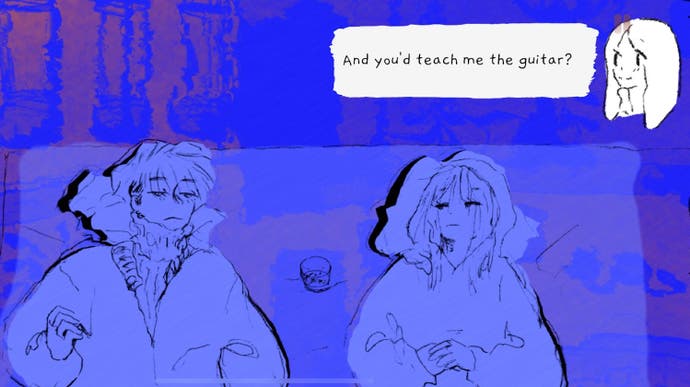
Society's expectations in If Found… mainly manifest through Kasio's Mam, who's somewhat in denial about Kasio's identity, and somewhat confused about it altogether. "Mam is determined [that] me and Fergal will pass on her brown bread recipes," is a reminder of the heteronormative expectations that are so often put on everyone, not just queer people. Kasio's mother expects her children to foster their own nuclear family, passing down domestic traditions, wanting future generations to uphold traditions of the past. It's a fleeting line and something that might even seem inconsequential, but it gestures towards something greater.
In private, Kasio imagines a different life for herself and deals with her difference in a variety of ways, namely with how she's illustrated. You see, the screen you're looking at in the game is Kasio's journal, meaning most things on display come directly from her imagination, her memories, and her perceptions. And in her journal, Kasio's self-illustrations are blurred and vague. Her features are unclear compared to most other characters, almost as if she's ashamed of how others might see her - even in a private journal, she checks herself. Or maybe she's pushing past the restrictions that have been put on her own body through these abstract depictions; a form of rebellion.
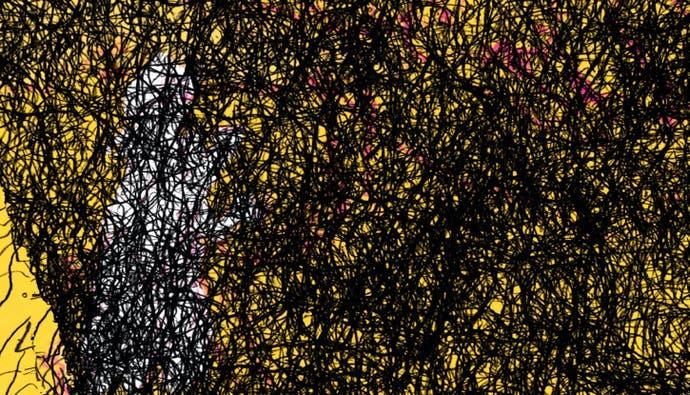
Unlike other visual novels, tapping or clicking the screen in If Found… doesn't reveal new text, it deletes it. Every swipe washes away the surreal illustrations and words on screen, erasing Kasio's journal, and revealing the next scene just behind. That framing device adds uncomfortable, albeit interesting, implications to the game, as a potentially cisgender audience is erasing a marginalised person's experiences, thoughts, feelings, and life. But the device takes a sadder tone when it's revealed that Kasio herself is the one who's doing the scrubbing, checking her queerness by deleting it.
An earlier scene in the game sees Kasio going to her first music gig; a dark crowded venue where some alternative rock bands are playing. Here, we finally see Kasio unhindered by the weight of other's expectations; unchecked, happy, and free to dance. But part of her newfound comfortability comes from her invisibility in the crowd - "in the anonymity of the crowd, I was free," she says, as her journal pages are flooded with scribbles and the entire crowd merges into abstract visual noise.
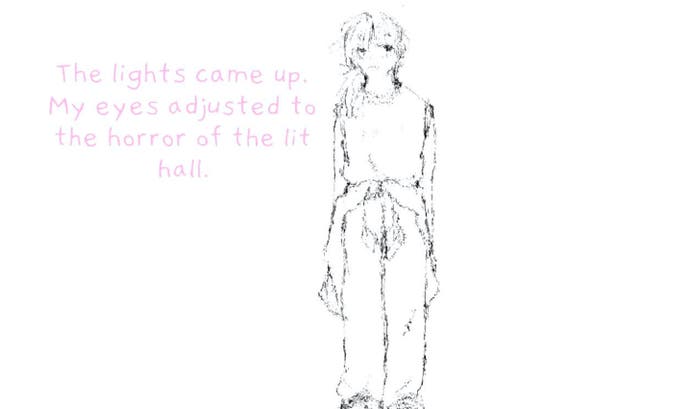
So, her self-erasure can also be read as Kasio, once again, hiding herself, making herself and her experience invisible, or undetectable, or non-existent, in order to not disturb the world's established beliefs. Checking her queerness by deleting it.
Worry not! Things pick up for Kasio before the credits roll. Most of the game plays out via Kasio's journal entries, but occasional scenes dip into a science fiction subplot following an astronaut called Cassiopeia who's trying to stop a universe-ending black hole. It's not immediately clear if these scenes take place in Kasio's imagination, recreating herself as a headstrong cosmic hero, compared to the shy, self-conscious girl she really is throughout the story. Things clear up when (through some space-time shenanigans that make more sense in-game) the only way for Cassiopeia to stop the impending disaster is to go back in time to 1990s Ireland, leave one of Kasio's drawings in her Mam's post-box, and repair their relationship.
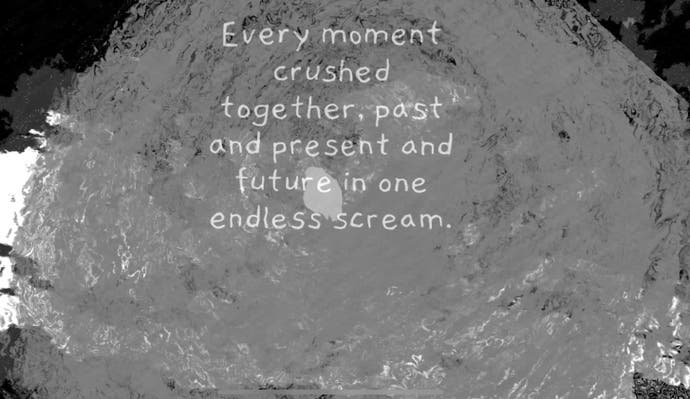
This is a high fantasy sub-plot, but what it effectively does is take a quiet, human, marginalised story, and turn it into a grand (not the Irish kind) affair with galactic significance. On the surface, If Found… is a niche tale about a very specific experience from a very specific place and time. Sure. But the world-ending sub-plot is a statement that those small, seemingly inconsequential, experiences are so, so important. The universe wouldn't be whole without people like Kasio.
From there, as promised, things turn around for Kasio. She repairs her relationship with both her Mam and her friends. Her self-illustrations go from inconclusive sketch to a tangible picture, one that we can customise, further aligning our experiences with hers and bridging that queer gap between 1990s Ireland and wherever you may be.
What Kasio does throughout the game is use her journal as a safe haven away from everyone else. It's a place where Kasio is in flux, constantly changing, and finding herself without the gaze of others. Replaying her story had me thinking back on how, very often, games offered that same asylum to me. I remembered how I was very definitely gay in the Fable games before I had even begun to think about what that meant outside of Albion. I remembered playing the Mass Effect trilogy, confused, not at my own sexuality, but at how the games restricted my ability to express that. I remembered playing Gone Home as a teen in the privacy of nighttime, coming to some sad realisations about what the future might hold for me. I remembered playing Halo multiplayer and hearing "gay" be used as a slur, realising that only the good players must have been queer, because how else were we constantly making people rage over the mic?
All of these games were my queer journals in a way. Spaces, away from prying eyes, where I didn't need to check myself. The journey isn't always easy - some days you're unequivocally happy in your own skin, other days you might choose to write about your feelings on Eurogamer behind a pen name - but even when all of those saves and digital spaces have been erased, just like Kasio's journal, they still lead to something ultimately good.
